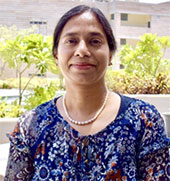SPS BISP TC Webinar: 14 February 2023, presented by Dr. Anubha Gupta

Upcoming SPS-BISP TC Webinar
Title: Tensor Decompositions in Functional Neuroimaging
Date: 14 February 2023
Time: 3:00 PM (CET)
Duration: Approximately 1 Hour
Presenters: Dr. Anubha Gupta, (IIIT, Delhi)
Register for the Webinar
Abstract:
Biography:
Anubha Gupta received the B.Tech and M.Tech degrees in electronics and communication engineering from Delhi University, India, in 1991 and 1997, respectively. She received the Ph.D. degree in electrical engineering from Indian Institute of Technology (IIT), Delhi, India, in 2006. From 2008 to 2010, she received a second Master’s degree in education as a full-time student from the University of Maryland, College Park. She worked as Assistant Director with the Ministry of Information and Broadcasting, Government of India (through Indian Engineering Services) from 1993 to 1999 and, as faculty at NSUT-Delhi (2000-2008), and IIIT-Hyderabad (2011-2013), India.
Currently, she is working as a Professor at IIIT-Delhi, where she served as the Dean, Academic Affairs from June 2019 to June 2020. She has authored/co-authored more than 100 technical papers in scientific journals and conferences. She has published research papers in both engineering and education. A lot of exciting work is being taken up in her lab: SBILab (Lab: http://sbilab.iiitd.edu.in/index.html). Her research interests include applications of machine learning in cancer genomics, cancer imaging, biomedical signal, and image processing including fMRI, MRI, EEG, ECG signal processing, and Wavelets in deep learning.
Dr. Gupta is a senior member of the IEEE Signal Processing Society (SPS) and a member of the IEEE Women in Engineering Society. She is a technical committee member of BISP committee of IEEE SPS from January 2022 to December 2024.


